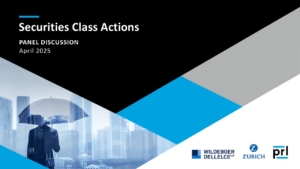Five Things to Know about Advertising and Marketing iGaming in Ontario
There are many regulatory and compliance issues that internet gaming (“iGaming”) operators (“iGaming Operators”) must consider when operating an iGaming site, not the least of which includes the rules and regulations that govern how iGaming can be advertised and marketed. Indeed, sports fans and iGaming consumers alike are already experiencing how these rules and regulations effect the business of iGaming. With this in mind, here are five things to know about advertising and marketing iGaming in Ontario.
1. The Registrar’s Standards for Internet Gaming (the “Registrar’s Standards”) set out the minimum requirements for advertising, marketing and promoting internet gaming (“iGaming”).
The Registrar’s Standards set out the bare minimum requirements iGaming Operators and iGaming-related suppliers (“iGaming Suppliers” and together with iGaming Operators, “iGaming Participants”) must meet. These include requirements such as:
a) restricting the ability for iGaming Participants to target high risk, underage or self-excluded people;
b) ensuring any marketing, advertising or promotions are truthful and do not mislead players or misrepresent products;
c) imposing certain limitations on the use of gambling inducements, bonuses and credits (see point 2, below); and
d) providing an opt-in and opt-out process where players can actively provide or withdraw consent to receiving any direct advertising and marketing of inducements, bonuses and credits.
2. Inducements, bonuses and credits are strictly regulated.
Pursuant to Section 2.05 of the Registrar’s Standards, any public marketing or advertising of gambling inducements, bonuses and credits is strictly prohibited. However, Section 2.05 provides a carve out which allows for inducements, bonuses and credits to be advertised in two ways: (1) on an iGaming Operator’s site or app; or (2) through direct communication to individuals that have first consented on the iGaming site to receive such communications. The marketing and advertising of inducements, bonuses and credits are subject to the following conditions:
a) any marketing or advertising materials that communicate gambling inducements, bonuses and credits must disclose all material conditions and limitations of the offer at its first presentation on the iGaming site, with all other conditions and limitations no more than one click away;
b) any induments, bonuses and credits cannot be described as “free” unless they are truly free. If a player must risk their own money or conditions are attached to their own money, then the inducements, bonuses and credits cannot be described as “free” and the conditions must be disclosed; and
c) any inducements, bonuses and credits cannot be described as “risk free” if the player needs to incur any loss or risk their own money to use or withdraw winnings from the risk-free bet.
Importantly, any consent obtained from individuals to receive directly communicated marketing and advertising materials relating to inducements, bonuses and credits for a certain iGaming site must be obtained from that particular iGaming site. This means that iGaming Operators cannot rely on consents obtained from consumers elsewhere, such as a third-party site or a separate iGaming site. Lastly, it is also important to note that under the Registrar’s Standards, direct marketing and advertising includes direct messaging via social media, email, texts and phone calls.
3. The AGCO’s guidance allows for many types of promotional partnerships, but partnerships must not allow access to iGaming sites at a physical premises.
On March 11, 2022, the AGCO updated its Internet Gaming Go-Live Compliance Guide to include additional guidance on the use of promotional partnerships in the iGaming space. Specifically, the AGCO highlighted that iGaming promotional partnerships cannot provide gaming devices or equipment to players to access iGaming sites at a physical premises. Under the current regulatory framework, iGaming Operators may only operate an iGaming site over electronic channels. This means that setting up a kiosk or providing players tablets or other devices allowing players to access an iGaming site is prohibited.
iGaming Operators interested in entering into promotional partnerships with celebrities and role models must ensure that any cartoon figures, symbols, role models or celebrity endorsers engaged in connection with such partnerships do not primarily appeal to minors. As the legal framework surrounding the advertising and marketing of iGaming evolves, iGaming Operators should pay particular attention to industries such as eSports that appeal to both adults and minors.
The AGCO has further highlighted that while it has not imposed limits or restrictions on the volume, types of channels or timing of advertising and marketing, it intends to monitor industry activity and may impose such limits if it deems necessary.
4. iGaming Operators are responsible for ensuring any third parties they contract with meet the Registrar’s Standards.
On March 16, 2022, the AGCO published additional guidance relating to the marketing and advertising of iGaming sites, which included guidance relating to the use of third-party advertising and marketing contractors, sometimes known as “marketing affiliates”. In its guidance, the AGCO applied Section 1.19 of the Registrar’s Standards to marketing affiliates, specifically stating that iGaming Operators are responsible for the actions of any marketing affiliates they contract with and must require them to conduct themselves as if they were bound by the same laws, regulations and standards of the iGaming Operator, to the extent such affiliates are carrying out activities on behalf of the iGaming Operator. In short, this means that iGaming Operators will be responsible for ensuring that any influencers, bloggers or advertising agencies hired by them comply with the applicable iGaming marketing and advertising regulations.
Lastly, both the AGCO’s guidance and the Registrar’s Standards are clear that iGaming Operators are responsible for ensuring that any marketing affiliates they contract with do not also provide any unregistered iGaming sites with direct-to consumer marketing, direct-to-consumer promotion or player referral services for commission or any other form of compensation.
5. Truthful advertising and informed play.
Under the Registrar’s Standards, any offers made by iGaming Operators must meet certain requirements including: (i) being truthful; (ii) not misleading players or misrepresenting products; and (iii) not communicating products or promotions that are not reasonably attainable without incurring substantial losses. Further, game design features such as inducements and credit promotions must be designed in such a way to assist in preventing continuous and impulsive play and facilitate low risk play behaviours.
Finally, all advertising and marketing materials must include a responsible gambling message.
What is Happening in the Market?
Over the last several months, the AGCO has announced several enforcement actions against notable iGaming Operators in connection with violations of the marketing and advertising standards outlined in the Registrar’s Standards. For example, on May 3, 2022, the AGCO announced it had served notices of monetary penalties against BetMGM Canada (“BetMGM”) and PointsBet Canada (“PointsBet”) for $48,000 and $30,000, respectively. In the case of BetMGM, the AGCO alleged that BetMGM had posted tweets announcing various inducements contrary to Standard 2.05, which prohibits any public marketing or advertising of gambling inducements, bonuses and credits unless otherwise carved out by the Registrar’s Standards (see Point 2, above). The AGCO also alleged that BetMGM posted a tweet stating “the more money you put in per bet, the higher your chance is of winning,” contrary to Standard 2.04 which expressly prohibits advertisements implying that the chances of winning increase as someone spends more money. For its part, the AGCO alleged that PointsBet violated Standard 2.05 by putting up posters at various train stations which included inducements.
On June 30, 2022, the AGCO announced that it had issued $100,000 in monetary penalties to Crown DK CAN Ltd., a subsidiary of DraftKings Inc. (“DraftKings”), for alleged advertising and inducement infractions. Specifically, the AGCO alleges that, contrary to Standard 2.05, DraftKings posted or aired over social media and television, multiple broad gaming inducements which included inducements of boosted 2:1 odds.
If you have any questions with respect to the matters discussed above, please contact Michael Rennie at [email protected], Jeff Bookman at [email protected], Brendan Wu at [email protected] or any other member of our Entertainment, Media, (e)Sports and Gaming practice group.
This update is intended as a summary only and should not be regarded or relied upon as advice to any specific client or regarding any specific situation.
If you would like further information regarding the issues discussed in this update or if you wish to discuss any aspect of this commentary, please feel free to contact us.
Latest News








